The average family in Ireland pays 40% more tax than it did four years ago
The Irish State depends on low and middle income earners to keep our economy afloat.
When tax on income is too high, the black economy prospers and high earners are frightened away. An average rate of tax of 35 per cent is acceptable, if essential services are freely available. The Government takes more than 50 per cent, that’s the breaking point for taxpayers. If high earners cannot control their tax bills, they may migrate to where the tax regime is more favourable. For those who cannot avoid tax by legitimate means, the black economy is their only hope.
The system is out of control. So the Government has descended on low- and middle-income groups to fix the problem. Nearly 90 per cent of government spending goes on welfare, health and education. This year the tax revenue will be about €36bn. Social protection will gobble up €22bn. When combined with the cost of health and education, we are spending much more than we are taking in.
There are between 300,000 and 400,000 fewer taxpayers today than there were four years ago. That’s a drop of 16 per cent to 20 per cent. But with fewer taxpayers, we are paying more income tax than we ever did and all other taxes are higher too. In 2008, income tax alone yielded €13.2bn. In the 11 months to November 2012, we have already paid nearly €13.9bn.
If you are a high earner, you are paying more tax today than you did when the recession began, unless your income has dried up. But ignoring some tax shelters that are no longer available, your effective or average rate has not gone up as much as lower- and middle-income groups. You may be paying 15 per cent to 20 per cent more than you did before. Tax rates have been kept the same and the cuts in personal credits are small relative to high gross income.
If you maximised your pension funding, you will be paying a lot more tax now. You can get relief on less than half what was possible in 2008. Back then, you could cut taxable income by €110,095. Today the maximum is €46,000. For that you must be over 60 and you cannot avoid PRSI or the USC. There are more restrictions coming in 2014.
A typical single person on €50,000 to €60,000 a year will probably pay 25 per cent more tax next year than they did in 2008. And that’s before they pay the new Local Property Tax (LPT). Unless they are a first-time buyer, they will have lost mortgage-interest relief worth €600 or more. Tax relief for bin charges and trade-union membership are gone. Relief for health expenses is restricted to 20 per cent, having been allowed 41 per cent until 2008.
The situation is worse for families. The loss of mortgage-interest relief could be double that for a single person. Tax at the 41 per cent rate may take another €1,092 out of disposable income. If you had three children in school when the crisis began, who are now in college, you have lost €6,420 in child allowance and you will incur college fees of €7,500.
You are paying 40 per cent more tax today than you did in 2008. If we add the loss of child allowance and college fees, it will cost you four to five times more in 2013 than it did when the old system prevailed.
A one-parent family earning €40,000, with one child, will probably pay 76 per cent more tax in 2013 that they did in 2008. Personal credits, the PAYE credit and the one-parent family credit have all been cut and the 41 per cent takes a bigger bite of the cherry. The loss of child allowance for 18-year-olds will be devastating.
A self-employed individual earning €120,000 a year with some investment income and savings will be worse off by about 16 per cent. In 2013, tax on deposit interest will increase to 33 per cent. It was only 20pc in 2008. For the self-employed who do not pass their income through a limited company they will pay the USC at 10pc above €100,000. Personal tax credits were cut, but the self-employed never got the PAYE credit, so that cut didn’t affect them. Like everyone else, they will pay more tax at the 41 per cent rate. But the USC takes the most.
Capital gains tax will be 33 per cent next year. But few assets are being sold at a profit. The yield from capital gains tax fell from its peak of €3.1bn in 2007 to €416m in 2011. The rate change will have little impact. The same applies to capital acquisitions tax. The most it yielded in a year was €392m and that was in 2007. So far in 2012 it generated €260m. The higher rates will help, but income tax, consumer taxes and LPT are where the main increases will materialise.
For the 11 months to the end of November, corporation tax of €3.8bn was collected. It peaked in 2006, when it was nearly €6.7bn. In spite of the fact that companies contribute nearly 50 per cent less than they did before the downturn, they have not been asked for help for fear they will run away. If the 12.5 per cent rate of tax is the only thing keeping them here we have a problem. We are running out of things to tax. If workers don’t have enough left to pay the bills, their productivity and efficiency will decline. Then no rate of tax will attract the big companies.
Most of the corporation tax is paid by less than one per cent of companies. It’s widely reported that the effective rate is much lower than the 12.5 per cent we would like to get. This is partly due to the use of tax losses. For otherwise profitable groups, it might be possible to defer using these losses, until the economy can afford it. Even companies that have tax losses are cash rich and could help when we need it. It would be like money in the bank for them. Nobody is asking the right questions. They have too much to lose if they get the wrong answers.
On top of everything else we are paying more VAT (the standard rate is now 23 per cent instead of 21 per cent). The other consumer taxes such as excise duty, motor tax and VRT are higher too, and they will get even higher in 2013.
Hillary Clinton nominated for Tipperary International peace award
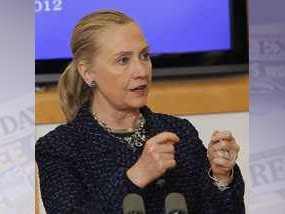

US Secretary of State Hillary Clinton has been nominated for the Tipperary International Peace Award just days after visiting Ireland and Pakistani schoolgirl Malala Yousafzai above right who was shot by Taliban gunmen last October.
A short list of five people have been released for the 2012 Tipperary International Peace Award.
Pakistani schoolgirl Malala Yousafzai who was shot earlier this year, president of the Indian National Congress Sonia Ghandi, former Kenyan journalist John Githongo and Pax Christi International, a non-profit Catholic peace movement, have also made the list.
The award winner will be announced on January 1st.
Previous recipients include former South African president Nelson Mandela, former Soviet president Mikhail Gorbachev, former US president Bill Clinton and last year’s recipients former president of Ireland, Professor Mary McAleese and her husband Senator Martin McAleese.
Peace Convention secretary Martin Quinn said Mrs Clinton joined the US State Department in 2009, after nearly four decades in public service as an advocate, attorney, first lady, and senator.
“Throughout her tenure she has looked towards “smart power” as the strategy for asserting US leadership and values, combining military strength with US capacities in global economics, development aid, and technology,” he said.
Mrs Clinton was in Ireland last week where she urged protesting loyalists to end street violence, and held talks on the crisis in Syria.
Mr Quinn said Ms Yousafzai was attacked by Taliban gunmen last October after she wrote about her desire to go to school without fear in a part of the country where the Taliban had once imposed strict Sharia law. Eventually airlifted to a hospital in Britain, she survived her severe wounds and is reported to be making a good recovery.
Italian-born Indian politician Sonia Ghandi, the widow of former prime minister Rajiv Gandhi, was nominated alongside Githongo, a journalist who investigated bribery and fraud in his home country. He later took a governmental position to fight corruption and accused top ministers of fraud. Pax Christi International is acknowledged for its work on a wide variety of issues.
Ireland’s health service staff to be cut by 3,200 next year
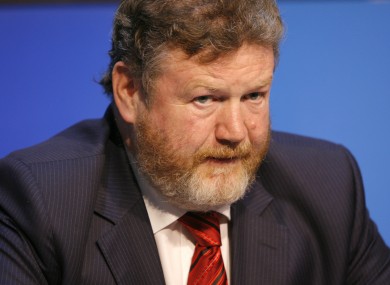

Health service staff numbers are to be reduced by more than 3,200 this year, according to a new Department of Health document on the implementation of the Croke Park deal.
The revised action plan on the deal says since its inception in 2010, the Public Service Agreement has helped the health sector reduce staff numbers by over 7,000. It is planned to cut health staff numbers by a total of 6,500 over 2013 and 2014.
The report warns that the number of staff to be taken out of the health service next year could rise to 3,800 if current approved but unfilled posts remain unfilled.
It says stakeholders must consider all options and cooperate with voluntary redundancy programmes and other measures to accelerate staff cuts approved by Government ‘as we collectively work to maintain and deliver a quality public service.’
On Budget day this week, Health Minister James Reilly said it was planned to save €308 million in pay costs in 2013, as part of the planned €781 million in health service savings.
The report says in addition to cuts in staff numbers, it is planned to save €10 million next year on rostering changes for nursing and care staff; €20 million on a reduction in junior doctor hours; and €3 million on rostering changes in elderly care.
Other planned changes include a revamp of time off in-lieu arrangements, continued staff redeployment, changes to sick leave entitlements, discontinuation of some allowances, changes to consultant work practices and reductions in their rest day entitlements, and an extensions of the working day across all therapy grades.
Further reductions in agency and overtime costs are also planned, as are reductions in nursing home service costs, restructuring of disability services, and a drive to reduce absenteeism rates.
Smartphone technology at its best as 50 year old Man is rescued from the Wicklow Mountains
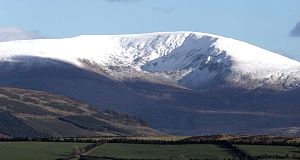
A man in his 50s was rescued this afternoon after he got lost while hill walking in Lugnaquilla in Co Wicklow.
The man is a competent walker and a regular user of the mountains, but he became disorientated during bad weather conditions when he was descending from Lugnaquilla towards Baravore Carpark in Glenmalure.
Mountain Rescue Teams located the man using a technology called SARLOC which enables the teams to use his smartphone to pinpoint his location and provide a grid reference.
Members of the mountain rescue teams made their way to the man’s location where they escorted him off the mountains.
This is the second such incident on Lugnaquilla in that past 24 hours.
Chinese Astronauts prepare to grow vegetables on Mars

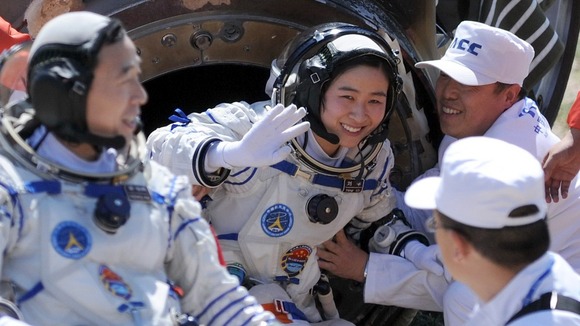
Chinese astronauts are preparing to grow fresh vegetables on Mars and the moon after researchers successfully completed a preliminary test in Beijing, state media reported.
Four kinds of vegetables were grown in an “ecological life support system”, a 300 cubic metre cabin which will allow astronauts to develop their own stocks of air, water and food while on space missions, Xinhua news agency said Monday.
The system, which relies on plants and algae, is “expected to be used in extra-terrestrial bases on the moon or Mars”, the report said.
Participants in the experiment could “harvest fresh vegetables for meals”, Xinhua quoted Deng Yibing, a researcher at Beijing’s Chinese Astronaut Research and Training Centre, as saying.
“Chinese astronauts may get fresh vegetables and oxygen supplies by gardening in extra-terrestrial bases in the future,” the report said, adding that the experiment was the first of its kind in China.
China has said it will land an exploratory craft on the moon for the first time next year, as part of an ambitious space programme that includes a long-term plan for a manned moon landing.
The Asian superpower has been ramping up its manned space activities as the United States, long the leader in the field, has scaled back some of its programmes, such as retiring its iconic space shuttle fleet.
In its last white paper on space, China said it was working towards landing a man on the moon — a feat so far only achieved by the United States, most recently in 1972 — although it did not give a time frame.
China’s first astronaut Yang Liwei said last month that Chinese astronauts may start a branch of China’s ruling Communist Party in space, state media reported.
“If we establish a party branch in space, it would also be the ‘highest’ of its kind in the world,” Xinhua quoted Yang as saying.
The astronaut was launched into space and orbited the earth aboard the Shenzhou 5 spacecraft in 2003.

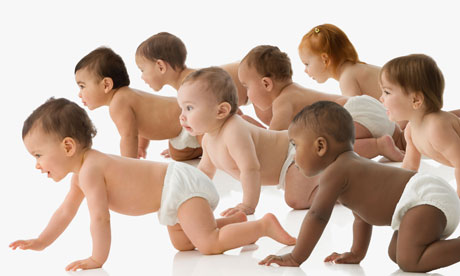
UhlenbrockCPA provides the best payroll services in san antonio. try our services to maximize your profit and save more. Call us @ (210) 701-1040 to book an apportionment
ReplyDelete